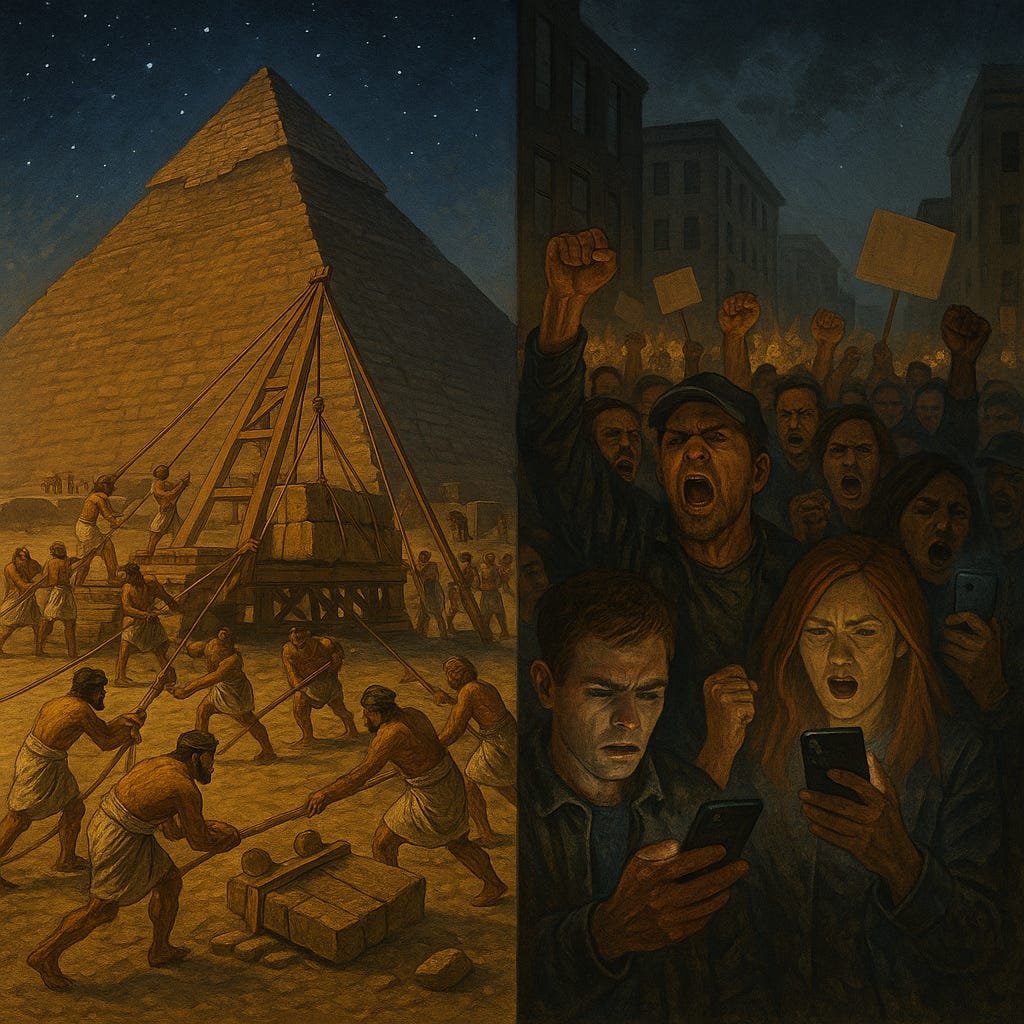From Chaos to Coherence: Escaping the Cycle of Violence
Civilizations Collapse When Meaning Splinters
Civilizations persist when meaning is shared. When coherence — the sense of belonging to the same story — is lost, the vacuum is often filled by rage, scapegoating, and even blood. The pattern is as old as history and as current as today’s headlines.
The Modern Fracture
Yesterday, Charlie Kirk, founder of Turning Point USA, was shot and killed during a campus event at Utah Valley University. Whether one agreed or disagreed with his politics, the violence is unmistakable: another fracture line in a society that is losing coherence.
Kirk had made a career on sharpening divides, framing politics as existential combat. His death will be read differently depending on which narrative camp you stand in — martyrdom to some, consequence to others. That’s precisely the problem: the absence of a shared frame of meaning. So violence fills the void.
It is not an isolated event. The storming of the U.S. Capitol on January 6, 2021, was another eruption born of a large bloc of Americans who no longer believed the system encoded their reality. Political murders, assassination attempts, and mass attacks punctuate our news cycles regularly.
The Pattern Is Ancient
This is not unique to our times or to America. History is a graveyard of civilizations undone by their own informational breakdowns.
Egypt (First Intermediate Period): Pharaoh embodied Ma’at, cosmic order. When central power broke, so did the story of Egypt as one people under one destiny. Famine and civil strife followed.
Rome: as civic religion gave way to elite cynicism and populist demagogues, coherence dissolved. The Republic fell into civil wars. Outside enemies simply took advantage of that disintegration of coherence.
Weimar Germany: hyperinflation, national humiliation, and fractured narratives made coherence impossible. Political violence became street routine, paving the way for authoritarianism and dictatorship.
Iraq (after 2003): removing Saddam Hussein collapsed the imposed coherence of the state. Without a unifying narrative, sectarian violence exploded.
Information-First and Violence
If reality is built on information, as proposed in It From Us, then coherence is civilization’s immune system. It holds us together across differences. When coherence breaks, entropy rules, and the results are brutal.
The media environment of today accelerates that breakdown. Social platforms incentivize division because division is sticky. Coherence doesn’t trend. Rage does.
What This Means
The lesson is simple but urgent: civilizations must invest in coherence as much as they invest in defense, infrastructure, or economics. Without it, all of those things collapse anyway.
Political violence is not born in a vacuum. It is born when people feel the story they are part of has been fractured or destroyed, when the system is no longer an encoding of their identity. The ancients wrote coherence in stone. We try to write it in laws and institutions. When those fail to hold meaning, violence is never far behind.
Choosing Coherence
Charlie Kirk’s killing is a warning flare, but it does not have to be our fate. Coherence can be rebuilt — but only if we treat it as essential, not optional. Hope comes when individuals, organizations, and societies take deliberate steps to re-encode meaning across the fractures.
For we as individuals:
Resist feeding on rage-bait. Pause before sharing content designed to inflame. It is not necessary to make others feel bad for you to feel better.
Reconnect across divides in small ways — neighbors, coworkers, even family. Shared humanity is coherence’s seed. Listen first to others, then explain your views.
Invest in truth-seeking habits: read outside your silo, ask what’s left out, question who profits from your anger. If your views can’t stand up to opposition, if your beliefs won’t allow evaluation against differing opinions, that does not bode well for their veracity.
For groups and organizations:
Build incentives for dialogue, not just visibility. Media platforms, schools, churches, companies can all re-center community over clicks.
Create spaces where competing narratives can be tested against reality — and where disagreement doesn’t equal exile.
Reward leaders who preserve coherence rather than amplify division.
For societies:
Protect free speech but de-monetize propaganda. Rage can be expressed, but it should not be the business model. Incremental ad revenue generated through the spread of hatred and fear is blood money.
Embed civics, media literacy, and shared history in education, so the next generation knows how to decode noise from signal. We began dismantling this apparatus in the United States in the 1970s. And our current situation is the cost.
Enshrine policies that defend truth infrastructure: election integrity, public record transparency, protection against algorithmic manipulation. Make hate inappropriate again.
Coherence Is Survival
Civilizations of the past carved their memory into stone because they knew survival depended on coherence. We may not build pyramids, but we have our own monuments to raise — laws, platforms, institutions, and communities that endure.
The choice is still open. Violence is the symptom of fracture, not the destiny of America or any society. If we work deliberately to restore coherence, meaning can outlast chaos. If we don’t, entropy will do what it always does.
The ancients left us monuments. Ours are yet to be built.



Excellent essay. You’ve articulated something crucial, that civilizations need to rely on coherence, bc if it fractures, violence rushes in. The challenge, though, is that coherence based only on social consensus is always fragile. It shifts with power, mood, and circumstance. Rome’s civic religion, Germany’s nationalism, Iraq’s imposed unity all eventually crumbled because their “shared meaning” was contingent.
For coherence to be sustainable, infinitely tenable, it can’t come from within the system alone. It requires an anchoring reference point beyond the flux of human subjectivity, something that doesn’t change with politics, tribes, or the incentives of media. Otherwise, every narrative eventually collapses into another fracture.
In other words, coherence needs a transcendent constant, not just a negotiated story. Without that, we are only postponing entropy, not overcoming it.